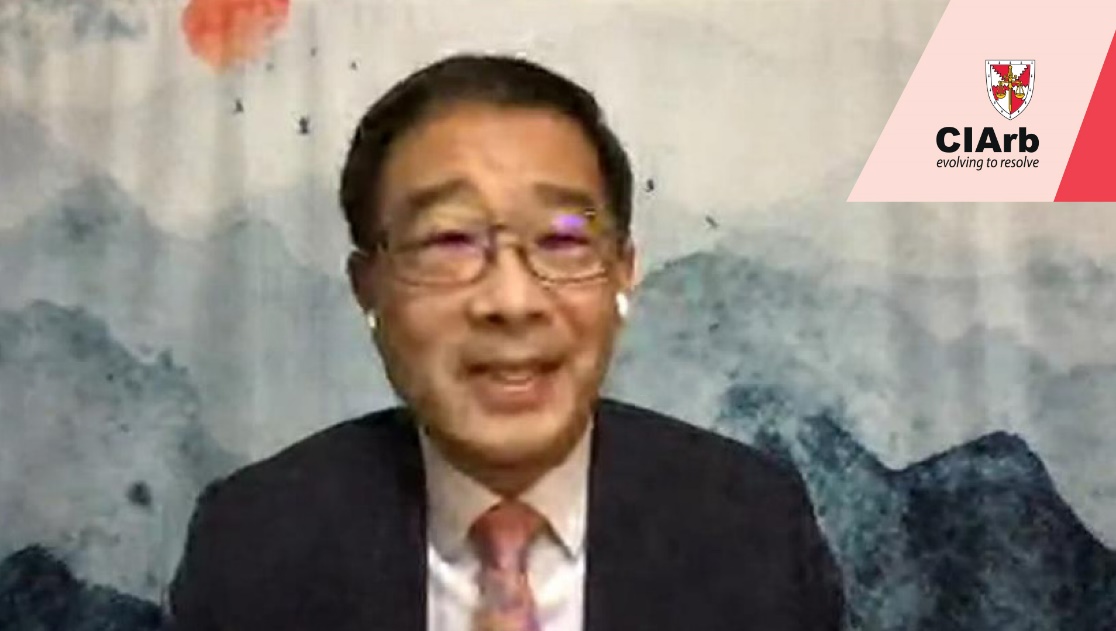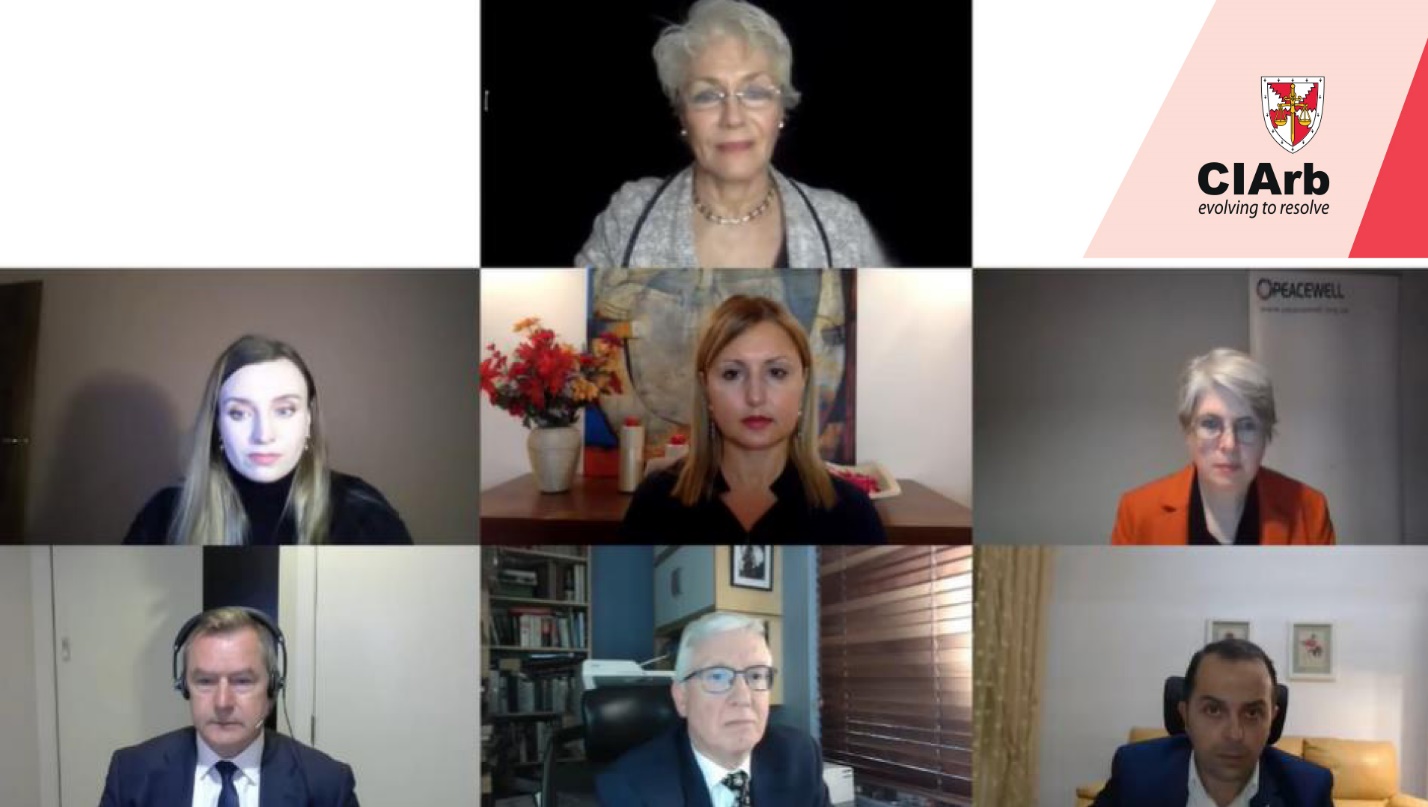CIArb News
Mediation Symposium 2020: Mediation as a multidisciplinary practice
09 Dec 2020
CIArb’s 2020 Mediation Symposium began with an address from George Lim SC who spoke on the theme of recent developments in mediation and the impact these have had on the interface between mediation and arbitration. George addressed four key points on this theme: the growth in popularity and use of mediation, the signing of the Singapore Convention of Mediation (SCM), the use of hybrid processes and the increasing move to remote proceedings.
When looking at the growth in the use and popularity of mediation, George cited specific examples from around the Asian region. First, he gave the example of the Singapore International Mediation Centre and their work to partner with institutions and courts in China to provide training. China has approximately 100 million disputes with an increasing interest in mediation to address this high volume of cases. The use of mediation in China in the past had focused on evaluative processes but parties are now moving more to facilitative processes as demand increases. Additionally, mediation is seeing significant growth in South Korea and Japan. And in India, says George, we see a real success story. Mediation has boomed in recent years in India to the point that the demand for mediation has now increased to the point where the legislature is drafting a national mediation act.
This growth and success of mediation around the world is reflected further in the signing of the SCM. This treaty was the result of four years of work by UNCITRAL Working Group II. 50 states participated in the exploration, negotiation, and drafting of the SCM which was signed in August 2019 in Singapore. 46 states initially signed (a record number for recent UN treaties) and included the United States, China, and India. This, noted George, means that the SCM covers around half the world’s population. Another 7 states have since signed and, even more crucially, 6 states have ratified the SCM, bringing the SCM into full force. During the 2019 visit to Singapore by the UK All Party Parliamentary Group on Alternative Dispute Resolution, hosted by CIArb, the participating Members of Parliament returned to the UK with the recommendation that the UK government join the SCM. In the single year since the SCM was signed, there is a noticeable trickle-down effect already being seen in the countries that have signed it with mediation being increasingly viewed as approved by the local government.

Another area where mediation is seeing growth, says George, is in the use of hybrid mediation and arbitration processes. Here, he cited the Queen Mary University of London 2018 International Arbitration Survey. When asked about the dispute resolution process they preferred in cross border disputes, around half of private practitioners and arbitrators responded that they preferred arbitration while the other half preferred arbitration with other ADR processes incorporated. However, when surveying in house counsel the preference for hybrid arbitration and ADR processes rose to 60%, with only 32% preferring arbitration alone. Across all parties, litigation was not desired. This, says George, shows that parties are tired of long, drawn-out dispute processes, including arbitration battles. Parties want to try any process that will speed a resolution along and will save costs. This is also confirmed by the Singapore International Dispute Resolution Association 2020 Survey. There, respondents clearly preferred mediation for speed and cost, while arbitration was preferred for enforceability and finality. The two were equally favoured for the impartiality and neutrality of the process.
This growing interest from parties in using hybrid processes led SIAC in conjunction with the Singapore International Mediation Centre (SIMC) to develop the Arb-Med-Arb Protocol which is now being offered to parties filing for arbitration with SIAC. Under the protocol, parties first register the case for arbitration and proceed with appointment of a tribunal through SIAC. The tribunal automatically orders a stay of the arbitration for up to 8 weeks while the case is referred to SIMC for mediation. If the case is settled in mediation, it is recorded as a consent award. If not, the case returns to arbitration at SIAC to proceed with arbitration as usual. Either way, pointed out George , parties get a result.
Finally, George noted the rising use of remote proceedings in both mediation and arbitration, which were on the rise before the COVID-19 pandemic. Now they are increasingly the norm and will continue to be, he predicted. This is because parties are realising significant cost savings from not needing to travel or procure physical facilities. Further, remote proceedings offer parties the flexibility to switch between processes quickly and easily, creating a further increase in the use of hybrid proceedings. George said that he expects this trend to continue well into the future.
In conclusion, he made four vital statements: First, the SCM will do for mediation what the New York Convention did for arbitration. Second, the growth and use of mediation globally are both phenomenal and unstoppable. Third, online and virtual proceedings will continue to be heavily used post COVID-19. And last, parties to international disputes are becoming more sophisticated and will increasingly demand any process that saves them time and costs. In summary, all parties want is for their problem to be solved, but this is not a zero-sum game. ADR lawyers and practitioners should see themselves as dispute resolution specialists who can design a process that fits the needs of clients. This may require increasing our training and improving our skills. But the lawyer or dispute resolution professional who can do this will have a distinct advantage in this field well into the future.
To read George Lim’s presentation, please click here.

Top: Jane Gunn FCIArb
Clockwise from top left: Karolina Jackowicz FCIArb, Vassiliki Koumpli, Sharon Crooks, Paul Sills FCIArb, Tony Guise and Dr Pierangelo Bonanno MCIArb
During the last session Jane Gunn FCIArb expressed gratitude to all six workshop leaders and requested them to share their respective key learnings. She highlighted that the symposium was focused on multidisciplinary approach of Mediation. This session concluded what Mediation could learn from other disciplines such as Psychology, Anthropology and Technology. Paul Sills FCIArb addressed how biases are related to our thought process, particularly in course of conflict. Also, he reflected that questions were raised by attendees of this symposium that whether AI (Artificial Intelligence) could slow down or remove all corners of biasness, particularly in case of confirmation bias. He analysed whether AI could help to do the decision-making process with the available information without any biasness.
To read Paul’s presentation, please click here.
Further, Karolina Jackowicz FICArb discussed about the future of mediation in 21st century and various aspects for improvement in usual business practice. Her session was based on customer-centric approach to serve the needs of the clients choosing mediation. Technology was emphasised to be embraced in this regard.
Vassiliki Koumpli (Mediator and mediation trainer) addressed that redesigning the mediation curriculum should be based on multidisciplinary approach, beyond legal principles. It should also include skills such as conflict management, negotiation strategies, emotion management, effective communication. To improve the multidisciplinary aspects of the mediation curriculum, technical skills should be added to it. To change the culture and make mediation as one of the alternate methods in legal practice, it is essential to include mediation in the curriculum. This will be beneficial for future lawyers, society as well as encourage the users of mediation.
To read Vassiliki’s presentation, please click here.
Further, Sharon Crooks (Founder of Peacewell) covered potential values that can be added by understanding neuroscience when people interact and behave in complex conflict situations in an organisation. Organisational psychologies could affect people’s behaviour. She added that mediation could facilitate people to tune into their needs. Mediation could encourage parties to move to collaborating space to find solutions, which helps people to negotiate and understand actual matters in dispute. Mediators need to open their door and follow multidisciplinary approach, rather than restricting yourself as a Mediator or negotiator it is advisable to consider yourself as a dispute resolution specialist. It helps parties to resolve their conflict. Tony Guise (Director of DisputesEfiling.com Limited) summarised the increased number of mediations across the world in different jurisdictions, including England & Wales. He referred to Sharon’s discussion regarding the change of people’s behaviour. People are much more willing to collaborate using online platforms. Currently, many ADR managing platforms are considered by Mediators (such as Zoom) to streamline the process of mediation in the 21st century by removing any bottleneck of delays.
To read Tony’s presentation, please click here.
Dr Pierangelo Bonanna MCIArb (Mediator and ADR trainer) addressed that every mediation differs in its design as per need of the case. He also emphasised on the inclusion of technology in conducting mediation to meet the changing needs of the time. While designing the mediation process, it is essential to bear in mind that not all parties would be legally sound enough to understand the contract or some of them would not have English as their first language.
To read Dr Pierangelo’s presentation, please click here.
At the end, Jane summarised the entire workshop by highlighting some key aspects. As indicated by Paul Sills, mediators should be aware if the parties in the mediation are angry, hungry, or lonely or tired. Different levels of our brain, whether emotional or logical, plays important roles in mediation. Also, it is very important to simplify and clarify the process of mediation as rightly pointed out by Dr Pierangelo. Karolina’s talk about the popular use of technology in mediation processes especially after COVID-19 situation makes a very strong point towards future of mediation. Further, as Vassiliki addressed that along with being academically qualified mediators, practice or experience is vital. It is also important to understand the psychology of parties to provide solutions. Also, use of automation or transformation via AI has been making prominent changes in the use of mediation, particularly in cyber security. Considering GDPR and AI in mediation could revolutionise the whole process of ADR.
Therefore, this session was focused on discussing various aspects of mediation which could prove to be a game changer.
12 Apr 2024
Significant progress on Advisory Centre for International Investment Law at UNCITRALIn 2017, UNCITRAL Working Group III (WGIII) was launched and was tasked with working on procedural reform of the investor state dispute settlement (ISDS) system. From 1-5 April 2024, Ciarb participated in the 48th session of WGIII in its capacity as an observer delegate.
12 Apr 2024
A promising future: Strengthening mediation through diversityWe speak to mediator and Imam Ibrahim Hussain MCIArb about mediation’s bright future, and why diversity strengthens mediation.
12 Apr 2024
RIDW24: Construction Arbitration Trends and Key TakeawaysCristen Bauer, Ciarb's Head of Policy, highlights a few key takeaways from the discussions at Riyadh International Disputes Week 24 (RIDW24)